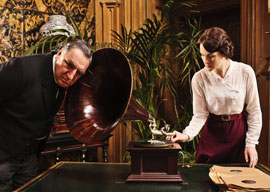
January 09, 2014

“The first episode of Downton Abbey‘s fourth season was watched by 10.2 million people in the US on Sunday, a record for a series premiere on PBS.” So says the BBC. That’s a lot of viewers, putting the upstairs-downstairs aristocratic soap opera up there in popularity with major sporting events and Duck Dynasty.
I was one of those 10.2 million. That’s as remarkable as the viewing figures themselves, since I watch almost no TV nowadays.
Having a second childhood is a real phenomenon. As you make the turn into life’s home stretch, early patterns reassert themselves. My own childhood joys were books and the radio; we didn’t have a TV until I was twelve. I watched plenty of TV through my middle decades, but now I can’t be bothered.
Another thing that happens when you get older, though, is that your kids leave home. There are no more music practices or homework to supervise, no more football games or Nutcracker rehearsals to chauffeur, no more driving lessons or relationship advice to give, no more sibling rivalries to arbitrate or dating partners to pass judgment on”nothing but Mom and Dad staring at each other across the living room, desperately trying to think of something to talk about other than the dog’s bowel movements.
Well, my lady likes watching Downton Abbey, so I’ve been watching it with her”all the first three seasons from Netflix, then on Sunday this first episode of Season Four.
I must say”it’s not bad. The plots are a bit ramshackle in places, and there are some anachronisms of speech and manner, but the writers have succeeded in creating a little world inhabited by people whose fates you care about enough to keep watching.
It’s odd that the thing should be so popular, though. The snobbish, hierarchical society it portrays is utterly at odds with our own age’s fanatical egalitarianism. Everybody is white and Anglo-Saxon-Celtic. Only prole women work, and then only as domestic servants. The lower classes defer to the upper; the upper condescend (in the old sense of treating inferiors with kindness, decency, and respect) to the lower.
Double standards abound. A male servant is threatened with arrest for stealing a kiss from another male servant. Lord Grantham scoffs at the fuss: “If I’d screamed blue murder every time someone tried to kiss me at [tony boys’ boarding school] Eton, I’d have gone hoarse in a month.”
It’s a lost world, but not that lost. The age of domestic service wasn’t so very long ago. My own mother’s first paid employment was as a children’s nurse in a manor house”Atherstone Hall, Warwickshire”though the inhabitants were gentry, not aristocrats. During the New York City mayoralty of David Dinkins, 1990-93, hardly a week went by without Dinkins reminding some interviewer that his mother had been in domestic service. Big deal: I’m 18 years younger than Dinkins.
In the USA I think domestic service lasted longer than in Britain. By 1950 the British middle and upper-middle classes were coping without cooks and housemaids. The Drayton family in Guess Who’s Coming to Dinner (1967) have a black maid.
Black American domestics reconciled themselves to their hireling status in much the same way the Downton Abbey staff do: by a rationale of knowing one’s place. One of the most memorable scenes in Guess Who’s Coming to Dinner is the one in which the black maid scolds the Sidney Poitier brain surgeon character for, essentially, not knowing his place.